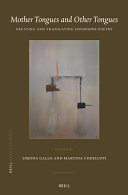

Most ebook files are in PDF format, so you can easily read them using various software such as Foxit Reader or directly on the Google Chrome browser.
Some ebook files are released by publishers in other formats such as .awz, .mobi, .epub, .fb2, etc. You may need to install specific software to read these formats on mobile/PC, such as Calibre.
Please read the tutorial at this link: https://ebookbell.com/faq
We offer FREE conversion to the popular formats you request; however, this may take some time. Therefore, right after payment, please email us, and we will try to provide the service as quickly as possible.
For some exceptional file formats or broken links (if any), please refrain from opening any disputes. Instead, email us first, and we will try to assist within a maximum of 6 hours.
EbookBell Team

4.3
28 reviewsHow do self-translation and other translingual practices mold the Sinophone poetic field? How and why do contemporary Sinophone writers produce (new) lyrical identities in and through translation? How do we translate contemporary Sinophone poetry? By addressing such questions, and by bringing together scholars, writers, and translators of poetry, this volume offers unique insights into Sinophone Studies, while sparking a transdisciplinary dialogue with Poetry Studies, Translation Studies and Cultural Studies.